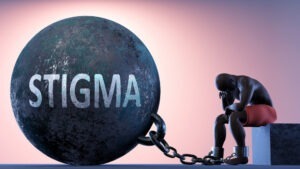Mental health affects everyone, but it is often overlooked in men because they are less likely to talk about their struggles. At the start of the pandemic in 2020, men died by suicide 3.88x more than women, and white males made up almost 70% 0f the total deaths by suicide. These issues with men’s mental health are nothing new, unfortunately, but talking about these issues can lead to awareness and further dialogue about them.
What are Stigmas?
There are many different kinds of stigmas that keep men silent about their mental health. Some of these stigmas include:
Social Stigma: This is when there are negative stereotypes or attitudes toward a person or group of people with a mental illness. A social stigma could take the form of “people with anxiety are too scared” or “you’re weak if you’re depressed,” to name a couple. These stigmas come from mental illness misconceptions that claim mental illness defines someone’s character, which is completely false.
Self-Stigma: This is also known as a perceived stigma or the way someone imposes stigmas on themself. Someone experiencing a self-stigma will internalize anything they perceive as negative about their mental illness, and they can begin to shame and judge themself for their own symptoms.
Professional Stigma: This stigma stems from healthcare workers stigmatizing their own patients. Usually, they have negative attitudes that come from misunderstandings or fear about mental illnesses. Healthcare workers can also experience stigmas toward themselves just because they work with mental health patients.
Cultural Stigma: This stigma is all about how someone’s culture views mental illnesses. Culture can play a big part in shaping someone into who they are, and this can change how they perceive mental illnesses. Culture can also affect how people cope and whether or not they will seek help for mental illnesses.

Masculine Norms and Their Negative Effects
One of the biggest issues for men’s mental health is the widely accepted masculine norms in American culture and society. These norms are supposed to be the normal rules and behavior associated with manhood. The common phrase “man up” is a great example of how men are thought to never show pain, sadness, or any other negative emotion. Society says that if they do show these emotions, then they are considered weak. These unfair norms lead many men to not reach out for help when they need it for fear of looking weak to others.
Men also tend to face more self-stigmas that make them downplay any issues they are facing, resulting in fewer men seeking help compared to women. Many cultures don’t teach the men of their society how to talk about their emotions, and in many cases, they prefer when men stay quiet about them. Women are taught how to express themselves in many ways, but men are typically left out of this conversation completely. This results in many men struggling to talk about their troubles or even being unable to recognize what their troubles are.
Overall
Although men face a lot of hurdles with their mental health, society is changing little by little. If you’re a man or you know one going through mental health troubles, you’re not alone. There may be a lot of stigmas that men face with their mental health, but always remember that they are false. Seeking help exemplifies inner strength and addressing any symptoms you may have will help you get back to being the best version of yourself.




